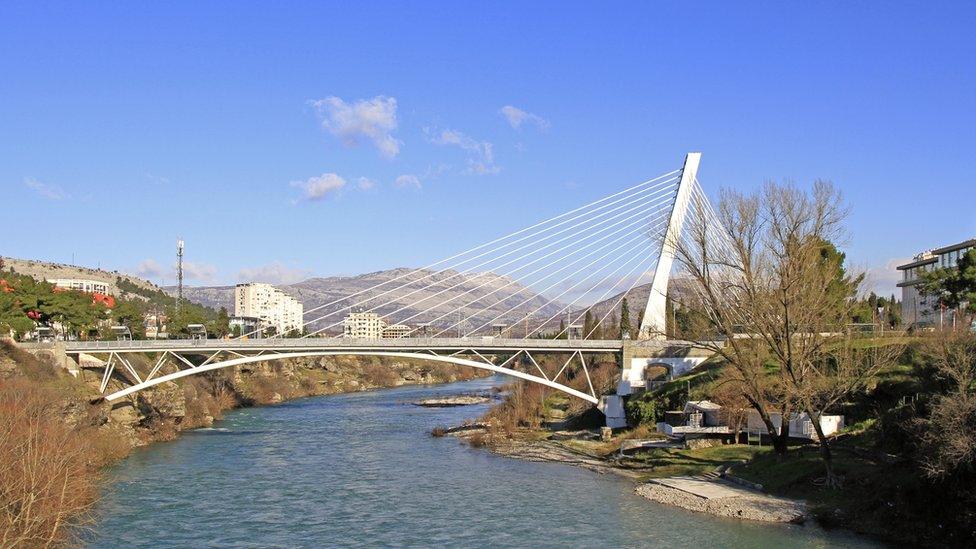Montenegro profile - Timeline
- Published

The Millennium bridge in Montenegro's capital, Podgorica
A chronology of key events:
15th-18th Centuries - Montenegro retains substantial measure of autonomy from Ottoman Empire.
1798 - Montenegro acknowledged as independent principality.
1878 - Montenegrin independence recognised under international treaties.
1918 - Following World War One, Montenegro becomes part of Kingdom of Serbs, Croats and Slovenes.
1929 - Kingdom of Serbs, Croats and Slovenes renamed Kingdom of Yugoslavia.
1945 - Together with Serbia, Slovenia, Macedonia, Croatia and Bosnia, Montenegro becomes one of republics in new Socialist Federal Republic of Yugoslavia under Josip Broz Tito.
1980 - Tito dies.
1991 - Milo Djukanovic becomes Montenegrin prime minister.
Montenegro supports union with Serbia as Slovenia, Macedonia, Croatia and Bosnia break away.
1992 - Montenegro joins Serbia in Federal Republic of Yugoslavia.
Rising nationalist and independence aspirations bring bloody conflict with Croats and Bosnian Muslims.
UN imposes sanctions on Federal Republic of Yugoslavia.
1997 - Milo Djukanovic defeats pro-Milosevic candidate in Montenegrin presidential election.
1999 - Milo Djukanovic declares Montenegro not a party to the conflict over Kosovo as Serbian President Milosevic's actions there spark Nato air strikes.
Montenegro abandons dinar in favour of German deutschemark.
2000 - Milosevic ousted by pro-Western reformers in Belgrade. Montenegrin leadership becomes increasingly independence-minded.
2002 January - Montenegro adopts euro as its currency.
Union with Serbia
2002 March - Yugoslav, Montenegrin and Serbian leaders sign EU-mediated accord to set up new state, to be called Serbia and Montenegro, in place of Yugoslavia.
2002 April - Government collapses over differences on the new union of Serbia and Montenegro.
2002 October - Parties allied with pro-independence Milo Djukanovic win Montenegrin general elections. He gives up presidency to become coalition prime minister.
2003 January - Serbian and Montenegrin parliaments approve constitutional charter for Union of Serbia and Montengro.
2003 May - Filip Vujanovic elected president.
2004 May - Prominent journalist and critic of Montenegrin government, Dusko Jovanovic, is shot dead. His paper, Dan, is seen as a mouthpiece for the republic's anti-independence opposition, and had alleged corruption in the Montenegrin leadership.
2004 December - Montenegro applies for membership of the World Trade Organisation.
2005 February - Montenegrin leaders write to their Serbian counterparts suggesting an early end to the Union of Serbia and Montenegro and the formation of two independent republics. Serbian Prime Minister Vojislav Kostunica rejects this.
Independence
2006 May - Montenegro holds an independence referendum. Just over the required 55% of voters say yes.
2006 June - Montenegro declares independence, Serbia responds by declaring itself the independent sovereign successor state to the Union of Serbia and Montenegro.
Montenegro becomes the 192nd member of the UN.
2006 August - Montenegro ends compulsory military service and says it will form a smaller, professional army.
2006 September - The governing coalition claims to have won an absolute majority in the first general election since independence.
2006 October-November - Prime Minister Milo Djukanovic steps down and is succeeded by his Democratic Party of Socialists ally, Zeljko Sturanovic.
2006 December - Nato admits Montenegro to its Partnership for Peace pre-membership programme.
2007 January - Montenegro admitted to IMF and World Bank.
Road to Europe
2007 March - Montenegro takes its first step towards European Union membership by initialling a stabilisation and association agreement.
2007 October - Montenegro adopts new constitution.
2008 February - Long-time leader Milo Djukanovic returns for a fifth term as prime minister after his party colleague, Zeljko Sturanovic, steps down on health grounds.
2008 March - Incumbent President Filip Vujanovic - an ally of Prime Minister Milo Djukanovic - wins re-election.
2008 November - Montenegro recognises Kosovo's self-declared independence, prompting protests from Serbia.
2008 December - Montenegro presents official application for EU membership.
2009 March - Prime Minister Milo Djukanovic's European Montenegro Coalition wins a landslide victory in parliamentary elections.
2009 December - Visa-free travel within EU's Schengen zone comes into effect for Montenegro's citizens.
Road to EU and Nato
2010 November - European Commission recommends that Montenegro be named as a formal candidate to join the European Union.
2010 December - Prime Minister Milo Djukanovic resigns, and is replaced by ally Igor Luksic.
2012 December - Milo Djukanovic becomes prime minister for the seventh time at head of coalition.
2013 January - The European Parliament says that Montenegro is on track to achieve EU membership, but calls on it to do more to protect media freedom, women's rights and gender equality.
2013 April - Filip Vujanovic wins a third term as president after narrowly winning an election.
2015-2016 - Opposition wave of protests against rule of Milo Djukanovic splits governing coalition, partly over corruption allegations and opposition to joining Nato.
2016 October - Government accuses Russian-backed forces of coup attempt on eve of parliamentary elections, and later indicts 14 people, including two Russian citizens.
2016 November - Dusko Markovic takes over as prime minister from his Democratic Party of Socialists colleague Milo Djukanovic after the party loses seats at the October election but remained in power due to an opposition boycott of parliament.
2017 June - Montenegro joins NATO, upsetting Russia, its traditional ally.
2018 April - Milo Djukanovic, leader of the ruling Democratic Party of Socialists (DPS), wins Montenegro's presidential election.
2020 May - Freedom House marks Montenegro as a hybrid regime rather than a democracy because of declining standards in governance, justice, elections, and media freedom.
2020 August - general elections results in a victory for the opposition parties - For the Future of Montenegro, Peace is Our Nation and In Black and White - and the fall from power of the ruling DPS, which has ruled the country since the introduction of multi-party politics in 1990.
2022 April - following a vote of confidence, a new minority government, comprising moderate parties that are both pro-European and pro-Serb, is formed led by Prime Minister Dritan Abazovic.